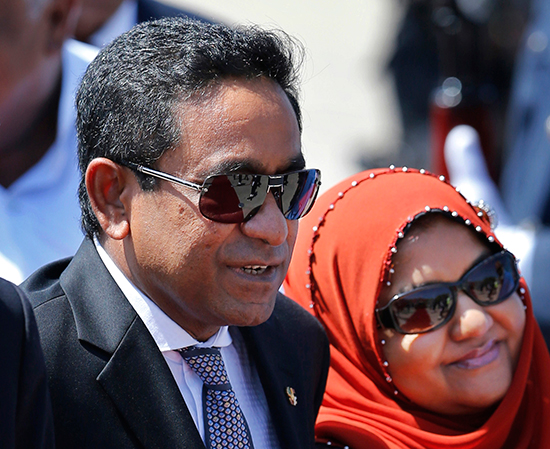Bangkok, September 9, 2016 – Authorities in the Maldives should cease harassing the Maldives Independent, the Committee to Protect Journalists said today. Police raided the daily newspaper’s office hours after the Qatari broadcaster Al-Jazeera aired a documentary produced by the paper’s former editor alleging high-level corruption in the Maldives.
Six police officers arrived at the independent, English-language daily’s office in the capital Male the afternoon of September 7 with a warrant authorizing them to search the premises on suspicion that the newspaper and its employees had participated in an alleged conspiracy “to overthrow the elected government, getting external help to overthrow the elected government, trying to create hatred between the public and state institutions, and planning to create discord and unrest in Male,” according to news reports.
Police searched desk drawers, took photographs of the office, and confiscated security camera footage, according to press accounts. Police also raided the office of a local human rights organization located in the same building, London’s Guardian newspaper reported, without identifying the organization. Two men were detained in the raid, The Guardian reported, without naming them.
The raid came hours after Al-Jazeera aired a documentary entitled Stealing Paradise — produced by the Maldives Independent’s former editor in chief, Will Jordan — that levelled allegations of corruption and abuse of power against President Abdulla Yameen Abdul Gayoom, press reports said. The Guardian reported that local journalists involved in making the film fled the country before the documentary aired, following warnings from officials that contributors could face jail time under recently stiffened defamation laws.
A government spokesman called the Al-Jazeera documentary’s allegations baseless, according to the news website Mihaaru.com.
Zaheena Rasheed, the current editor of the Maldives Independent, told CPJ in an email that she fled the country out of “fear of persecution” for being interviewed in the film. She said although the search warrant police used to justify the raid of Maldives Independent‘s office did not name a specific individual or institution, accusations of attempting to topple the government “are serious charges, and we worry a lot of what this could mean in terms of future action by the government.”
“To raid a newspaper on the preposterous pretext that it was plotting a coup because its editor appeared in a documentary alleging corruption is a transparent attempt at intimidation,” said Shawn Crispin, CPJ’s senior Southeast Asia representative. “The authorities should immediately stop all attempts to intimidate the press, and send a clear message to Maldives Independent editor Zaheena Rasheed that she can return home without fear of persecution.”
The Maldives Broadcasting Commission, a state regulator, said in a September 7 statement after the documentary’s release that local stations that rebroadcast the documentary’s allegations would be liable for prosecution under the country’s sweeping defamation laws, news reports said.
Criminal defamation legislation passed in August allows for maximum fines of two million rufiyaa (US$130,000) or six-month prison sentences for failure to pay fines, CPJ reported at the time. The law also allows the state to revoke broadcasters’ operating licenses for defamation convictions. In 2009, a previous government had amended the Penal Code to strike provisions making defamation a criminal offense.
